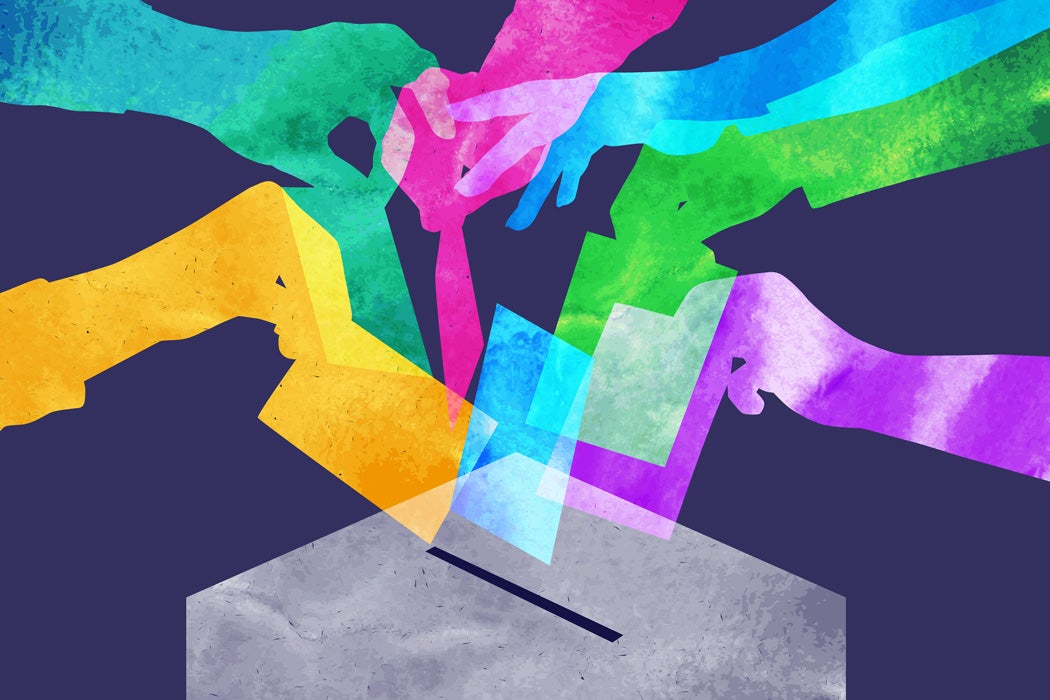The icon indicates free access to the linked research on JSTOR.
Even though it’s a cornerstone of representative democracy in U.S. politics, the right to vote expanded very slowly—and not without a fight in most cases. Today, voting is still contested, as some states have limited the franchise through redistricting, closing polling places, requiring official ID to vote, and other means.


Every time we get ready for an election, voting is on our minds. But those thoughts can be vague and lack historical and political context. With this syllabus, we hope to provide motivation to learn more—and to turn out!
Elections and Power
Voting and governing are different things, but both entail power. Our election system reflects that, but elections themselves can be convoluted processes in themselves.
October 23, 2020
Election days used to be raucous affairs, with individual votes sometimes cast orally for all to hear.
August 8, 2016
They don't campaign and very few know who they are, but you'll be voting for them this November: introducing the Electors. Again.
December 13, 2016
Is it finally time to reform the Electoral College after 2000 and 2016? If so, how could this be done?
March 19, 2018
Gerrymandering is the process by which districts for the House of Representatives are drawn so that one party has a distinct election advantage.
March 28, 2019
In our final security studies column, our columnist posits that security as a permanent mode of government is actually making Americans less secure.
July 18, 2016
What is the point of the party platforms unveiled at political conventions?
January 25, 2020
There's no denying the whiteness of the state. But scholars cite other qualities that make Iowa more like the rest of the country.
June 17, 2019
How "accidental" world leaders have faced the challenges of leading major democracies without being voted in.
September 17, 2018
In 1994, Republicans swept the midterms and Newt Gingrich became Speaker of the House. His “Contract with America” was both polarizing and transformative.
November 13, 2014
The "rational choice" model alone doesn't account for voting behavior. So what does?
August 29, 2016
Did you know that ballot position can have an effect on voting? The first-listed candidate is more likely to be voted for.
Fighting for the Right to Vote
It took a Civil War for Black men to get the right to vote. Millions were enfranchised when women got the vote in 1920, but Black women were mostly excluded from voting due to legal discrimination. Removing these injustices took both organizing and militance.
August 5, 2015
Passage of the act was paved by the sacrifices of Civil Rights activists, especially those who had recently put their bodies on the line at Selma, Alabama.
July 19, 2016
Susan B. Anthony discusses how women's rights have evolved in a 1902 North American Review piece, "Woman's Half-Century of Evolution."
June 3, 2016
Victoria Woodhull who was known to her enemies as "Mrs. Satan," was the first woman to run for president of the United States.
July 5, 2016
Shirley Chisholm: the first black female U.S. Representative, first black major-party candidate for President, and the first Democratic Party woman to run.
March 2, 2020
Historians Judith Apter Klinghoffer and Lois Elkis argue that this wasn't oversight. New Jersey legislators knew exactly what they were doing.
April 26, 2018
Reconstruction is one of the least-known periods of American history, and much of what people think they know about it may be wrong.
May 23, 2016
While racism in the United States is often attributed to poor whites, research suggests its political power resides in middle and wealthy suburban whites.
December 9, 2017
Women's suffrage was usually portrayed negatively in early films, but suffragists well recognized the importance of movies in getting their message out.
August 26, 2022
The passing of the Voting Rights Act in August 1965 prohibited the use of Jim Crow laws and discriminatory tests to disenfranchise Black voters.
November 1, 2022
Formerly incarcerated people comprise the largest group of disenfranchised American voters. The American Prison Newspapers collection offers fresh insight into the issue.
Who Are Voters?
Political scientists puzzle over the question for good reason: understanding voters, and voting, provides the kind of knowledge that can help citizens access the polls and exercise the kind of power that voting gives them.
October 19, 2018
In United States midterm elections, it is common for as few as 40% of eligible adults to vote. Why it matters, and some possible solutions.
November 3, 2016
Although in-person voter fraud is close to nonexistent, it’s a big concern for many voters.
October 17, 2018
If the standard we hold for who can vote is the consent of the governed, why shouldn’t children be included?
March 3, 2020
Conventional wisdom says that Republicans don't want to give ex-felons voting rights because they'll end up voting for Democrats. But is this true?
December 7, 2015
Studying voting data from 1840 to the 1990s, a correlation emerges between voter turnout and class conflicts throughout the country.
May 2, 2016
The voting patterns of actual independents have long been a topic of study. Who are they, and how do they actually vote?
December 5, 2019
Law professor and one-time presidential hopeful Lawrence Lessig on campaign finance, gerrymandering, and the electoral college.
Editors’ Note: This post was originally published on August 6, 2020 and has been updated with new stories October 28, 2020.

































